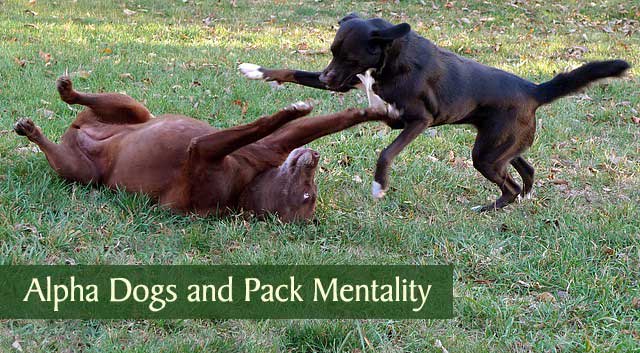 We’ve all heard the advice that as dog owners, we should be the alpha dog or pack leader in our house or else our dogs will assume the role, take over, and pretty much make our lives miserable. That’s the basic theory behind traditional dog training methods, made even more popular by a certain TV-show dog rehabilitator. The training style commonly uses dominance and force-type methods based on the notions of alpha dogs and pack mentality. Those concepts evolved from studies done more than half a century ago while observing wolves in captivity.
We’ve all heard the advice that as dog owners, we should be the alpha dog or pack leader in our house or else our dogs will assume the role, take over, and pretty much make our lives miserable. That’s the basic theory behind traditional dog training methods, made even more popular by a certain TV-show dog rehabilitator. The training style commonly uses dominance and force-type methods based on the notions of alpha dogs and pack mentality. Those concepts evolved from studies done more than half a century ago while observing wolves in captivity.
In contrast, positive reinforcement (+R or force-free) training takes a different approach based on using rewards to train and shape dog behavior, often controlling the resources a dog wants or needs and encouraging appropriate behavior out of the dog’s own self interest. In the world of positive reinforcement training, the terms alpha and pack leader are usually considered taboo, as they’re often associated with using force, threats or intimidation and sometimes create anxious or fearful reactions from dogs. But in this era of political correctness, have we gone too far in totally dismissing the notions of alpha dogs and pack mentality?
“In this era of political correctness, have we gone too far in totally dismissing the notions of alpha dogs and pack mentality?”
My Thoughts on Alpha Dogs and Pack Mentality
I’m a big believer in positive reinforcement training but I also know how effective a well-timed correction can be, as I talked about in the post Using Corrections With Positive Reinforcement Training. I believe domesticated dogs are still pack animals and even though we’re not part of a traditional canine pack with them, we are part of their social pack. As in any pack, there’s usually a leader that sets the rules for acceptable behavior and if the leader governs with fairness, rather than fear, there will be mutual respect and harmony within the group. In both animal and human social circles, I’ve noticed there’s usually a status ranking or pecking order between members of the social group. Here are a few examples.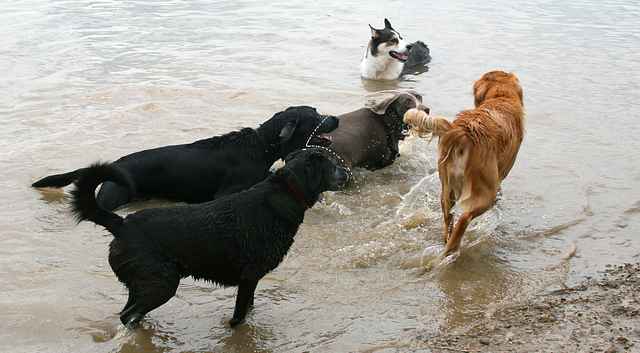
Am I the Alpha in Our Pack?
Yes, I do think of myself as alpha over Haley. It’s a popular notion these days for dog owners to think of themselves as equals with their dogs. Even the term dog owner is offensive to some people, but I’ll save that topic for another discussion. I don’t see myself as an equal to Haley because somebody has to create and enforce the rules, provide the food and shelter, drive to the vet’s office for medical care, etc. It’s my responsibility to assume the alpha role although I’m not sure Haley views me the same as she would view an alpha dog in a canine pack. What’s more important is the fact that we have a hierarchical structure based on mutual respect, and it works very well for us. Here are my roles and responsibilities as an alpha.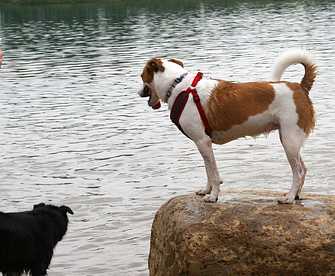 It’s a shame that the terms alpha and pack leader have become so closely tied to old-school, discipline and dominance-based training methods because the principles are still relevant and important. Some people may dislike the terms, but that doesn’t change the fact that someone has to lead, set the rules and keep the peace. In fact, the lack of leadership and structure is one reason some out-of-control dogs are surrendered to shelters by frustrated owners at their wits end. It’s also worth noting that every dog is different and some need more structure and guidance than others, but it should always be given via positive and humane methods built on trust and respect.
It’s a shame that the terms alpha and pack leader have become so closely tied to old-school, discipline and dominance-based training methods because the principles are still relevant and important. Some people may dislike the terms, but that doesn’t change the fact that someone has to lead, set the rules and keep the peace. In fact, the lack of leadership and structure is one reason some out-of-control dogs are surrendered to shelters by frustrated owners at their wits end. It’s also worth noting that every dog is different and some need more structure and guidance than others, but it should always be given via positive and humane methods built on trust and respect.
If your goal is to have a dog that listens and respects you, forget the notion of submissive alpha roles or making sure your dog never goes through a door before you. Focus instead on using positive methods of training your pup and you’ll become a truly benevolent and respected alpha in your pack.
What are your thoughts on alpha dogs and pack mentality?
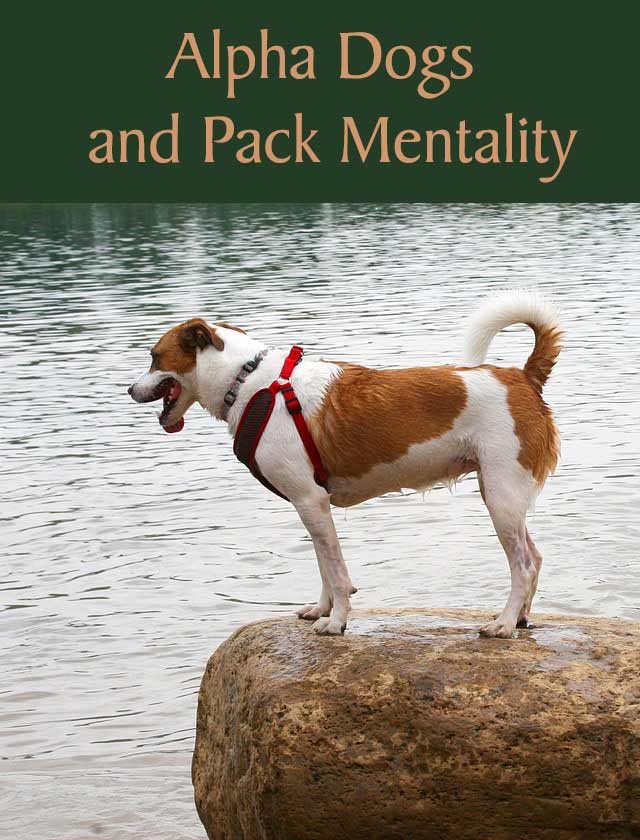
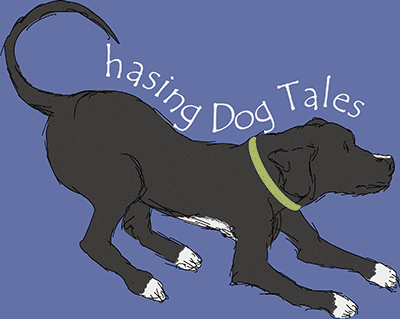
That’s a great write up on Alpha dogs and pack mentality. I always find it interesting observing my own dogs when a new dog/puppy visits. We have a new puppy about once a year and also puppy sit guide dog pups throughout the year. I’ve had both Linus and Stetson for quite a while now and they are on opposite ends of the spectrum. Linus likes to be the leader and shows the younger pups who’s the boss. On the other hand Stetson is a push over and will let puppies walk all over him, literally.
It’s fascinating how our dogs can be so different and I’m curious about how they can react so differently to other dogs too. Haley’s very calm and relaxed when meeting some dogs, but anxious when greeting others. Linus and Stetson really are at opposite ends but I bet it’s nice having the balance of both personalities types and energy.
It’s awesome having both personalities for raising the puppies. Linus teaches the pups when they are getting too out of hand. Stetson on the other hand will tolerate just about anything a puppy does to him. Every once in a while I have to step in to help out Stetson.
I think the terms become loaded when they’re used to “dominate” our dogs, or when we start to think they’ll plot a takeover if we don’t show them who’s Alpha, because they think we’re dogs too. That’s just silly.
I’m pretty happy being the Momma, and whatever leadership, respect and devotion that implies.
You’re so right, Kari! Unfortunately, those terms have become associated with dominance and a certain attitude towards dogs. I’m also known around here as Momma too! ?
Fantastic post about alphas and pack mentality, Elaine! Like you, I believe it’s a shame that many people have problems with the word “discipline” these days as they associate negativity with it.
I believe that, on the contrary, it is a powerful ally when wanting to achieve great, good things.
Just as a certain amount of discipline is required to eat healthy, exercise, populate our blogs, pay our bills on time, do a good job at work, etc., discipline is also required as far as raising our dogs is concerned and will pay off big time in the long run. I enjoy my well-behaved dogs and am so glad I set up rules and boundaries for our human & K9 lives together – I don’t do well with chaos around me 😉
I reward good behavior with treats, playtime, and affection from me, the pack leader, and believe that there have to be consequences for bad behavior as well.
For instance, I only give commands once, and if the pups don’t respond to that one command I won’t hand out any treats or repeat myself. I’ll try again a few minutes later.
If the pups try to lunge at another dog we happen to walk past and I can’t distract them by having them focus on myself, a toy or a treat, I will give a leash correction.
I never encounter any unruly behavior around feeding time because I incorporated our calm feeding routine years ago – we exercise before meals, leaving the pups relaxed and without pent-up energy, and very willing to lie down and wait for my ok to go eat. By doing so, I make sure not to set the pups up for failure – I don’t believe I’d be able to expect polite behavior if I didn’t incorporate our set of rules & regular exercise .
Yes, I love how you explained this, Barbara. “Discipline” has become somewhat of a bad word now too, but why do people automatically think of physical punishment when they hear the term?
I remember seeing your video of Buzz and Missy in your garage with the box challenge and I loved the way they both had fun enjoying that exercise and yet they were both very calm and respectful. It’s clear that you have a wonderful, positive relationship with both of them. ?
I agree with your theory, I too believe I am the pack leader in my house. A new dynamic is occurring though. Harley (7) has always been my shadow, Jax (1.5) is now moving into that role. While Harley remains close, Jax is up under me. There’s no struggle for dominance between the two of them, Harley still rules when it comes to Jax, but when it comes to me, Harley is allowing Jaxson more and more “Mommy time” then before. Dogs are fascinating creatures, we could learn so much from them.
That’s so interesting, Cathy. Harley must be feeling very comfortable, rather than threatened by Jaxson. It tells me you’re doing everything right to have two beautiful and well-adjusted Doodles! ?
Hi Elaine,
You are so right! I am a positive dog trainer and I use the term pack leader all the time. I dislike the fact that it has such negative thoughts to it. It is a fact that it must become an established rule that the dog owner or dog parent be that leader. They must as you say do it with love, kindness, and calmness.
I truly believe that when it comes to training a dog for any activity or trick, they pet parent needs to know what space they are in… if they are agitated, upset or have any negativity inside, it’s time to put off that training. Meditate, relax, get in your happy place before dealing with any issues with your dog. This is what I believe truly invokes positive dog training.
Thanks for sharing this post. Let’s get “pack leader” a more positive connotation.
Thanks so much, Suzanne! I love your point about being in the right frame of mind. It reminds me of a few times when I was trying to train Haley to walk on a loose leash when she was younger. There were a couple of occasions when I turned around and took her back home after only making it 30 feet down the street because I knew I was going to get so frustrated, that the walk would be counterproductive. It was much better to try again later when I was relaxed and in a positive frame of mind.
This is a great explanation of what an Alpha or Pack Leader should be – thank you!
Thank you, Jodi! I’m so glad you stopped by today and I enjoyed checking out your website too. ?
Excellent post. If more people understood what being the alpha meant or pack mentality (both you describe perfectly), less dogs would end up in shelters. I think one of the worst trends in modern training is believing that you should be equal to your dog. I know with Chessies, you better be a strong leader and set rules or chances are your life with them will be miserable.
Thanks so much for your input, Linda. Your point is so valuable, especially for breeds that have strong wills or that need more structure or training. I have to laugh at the thought of treating Haley as an equal. She would have a field day in the kitchen if she ever learned how to open the refrigerator door, haha!
Hi! I feel like we are like minded with our posts this week on dog behaviors. I think I’m the alpha with Shermie and I like the examples you have in the beginning of your post. Being a newbie co-worker is always stressful. I think some dogs need more time to accept others into their pack – this can take time! We also use positive reinforcement and it works! Although some days I fall down as the Alpha leader – it’s exhausting….
I was so thrilled to read your article and know that you’ve discovered some things that help with Sherm’s reactivity. One of the biggest things that helped Haley was taking over the role as protector. It seems that’s a bad combination…a fearful dog that feels like they have to be the defender. I did a lot of blocking and stepping in front of Haley to put myself physically between her and other dogs (and sometimes little kids that were approaching) and it made a huge difference to help her relax.
I loved your article this week, Christine. Great post! ?
Pippa is the pack leader in my house. When we have a new (sometimes temporary) dog in the house, she’ll make the house rules clear! Great article!!
Aw, Pippa’s a great teacher when new dogs come into your house. That makes things much easier for you too! ?
Well said! Great examples of how both humans and dogs need to figure out how and where they “fit” in the hierarchy of a new situation. I definitely see myself as the pack leader in our home but my husband doesn’t. Needless to say, my Husky usually doesn’t listen to my husband very well & kind of bosses him around, LOL! I lead with kindness, respect, and positive training methods but I’m firm with the household rules.
Love & Biscuits,
Dogs Luv Us and We Luv Them
Thanks, Cathy! I’m trying to visualize Icy bossing your hubby around, lol! I’m glad you can keep all of them in line. ?
I agree that you can be the alpha leader of the ‘pack’ without having to resort to discipline. I thought I was doing an okay job with Rita since she is *mostly* a very good girl, but I had a new trainer come by and she thinks Rita feels like she has to protect us rather than the other way around – and that’s why she’s reactive to some other dogs while out on a walk or to strangers when they come to the house. We’re working on teaching her that we’ve got her back and she can just relax and enjoy… but it’s slow going. Hopefully we can get to where she’s more relaxed.
Aw, Rita and Haley have that in common. I’ve been working with Haley for several years on this and it’s really helped. She’s much more relaxed and confident. Hopefully, Rita will start feeling more confident soon too. ?